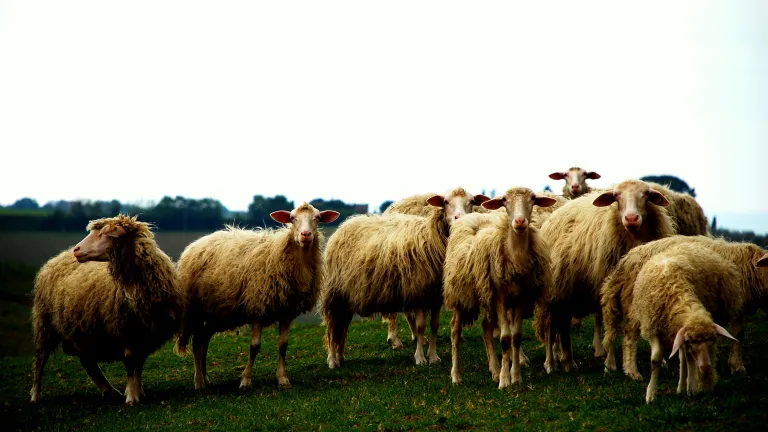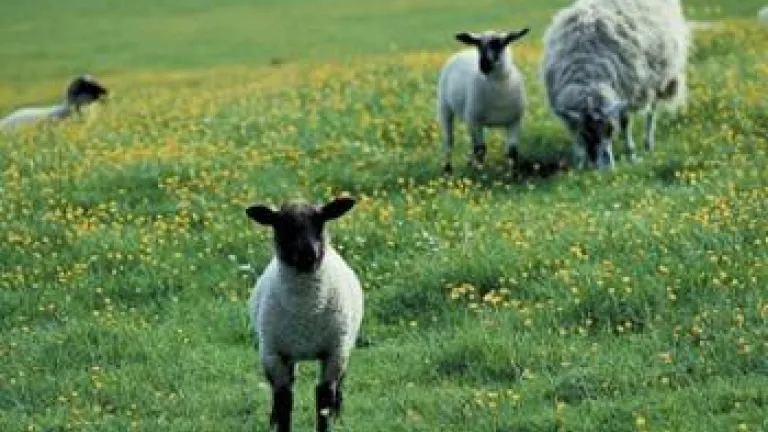What Is the Difference Between Sheep and Goats?

God apparently has very different opinions of two groups of people He calls "sheep" and "goats." But what is it about sheep and goats that makes such a big difference? And how can we know which we are?
I am not, nor have I ever been, a shepherd. My familiarity with sheep and goats ends after cartoon characters and mattress commercials. So many times, I feel like scriptures involving the concept of God’s Church being a flock, or of us being His sheep, or even of Jesus being a lamb go right over my head. For instance, in Matthew 25, this analogy, which is obviously included to help me understand something more, just left me more confused:
"When the Son of Man comes in his glory, and all the angels with him, then he will sit on his glorious throne. Before him will be gathered all the nations, and he will separate people one from another as a shepherd separates the sheep from the goats. And he will place the sheep on his right, but the goats on the left. Then the King will say to those on his right, ‘Come, you who are blessed by my Father, inherit the kingdom prepared for you from the foundation of the world' . . . Then he will say to those on his left, 'Depart from me, you cursed, into the eternal fire prepared for the devil and his angels' . . . 'And these will go away into eternal punishment, but the righteous into eternal life' (Matthew 25:31-34, English Standard Version).
So for us to be God’s sheep, we must depend on Him to defend us. If we push, take, destroy and bully, we are goats.
Why are the sheep and goats separated? Why are sheep better than goats? Why does one earn reward and the other earn punishment? How do I make sure I am not a goat? What if I already am a goat, and I don’t know it? The analogy continues to describe the works of the sheep versus those of the goats, but why? What inward difference produces such different outcomes?
I did a little research. Here is what I learned.
Fun facts: In North America, sheep and goats are easily distinguishable, due to specialization through breeding. Sheep are fluffy and wooly; goats are not. However, throughout history, and still today in parts of Asia and Africa, sheep and goats are almost identical, and no one but a shepherd can easily tell the difference. So the application here for the parable would be that outward conformity (being part of the herd) isn’t all that’s required of us. There is something that only our Shepherd can see in us, and that unseen thing tells God whether we are sheep or goats. It determines whether God sorts us to the left or to the right.
But what is it? I needed more research.
I learned that sheep have a reputation for being stupid and just sort of worthless (bummer!) However, again, the sheep of today are much different than sheep as they were created. Again, they have been bred in such a way as to produce fluffier, dumber sheep. But they are, and have always been, dependent on their shepherd and defenseless. Goats, on the other hand, have a reputation for being independent, opinionated and curious at best—or vulgar, dangerous and destructive at worst.
Here are some fun quotes about goats from a livestock forum: “If you leave goats in with your horse, they may chew off his tail.” “My dad has described goats as ‘Jack Russells with hooves.’” “If your fence won’t hold water, it won’t hold a goat.” And about 50 testimonies of goats climbing and butting cars.
So I would boil all that down this way: Shepherds protect sheep from their environment, whereas goatherds protect the environment from their goats. So for us to be God’s sheep, we must depend on Him to defend us. If we push, take, destroy and bully, we are goats.
The main thing though—the central difference between sheep and goats—is really simple. It's an idea that we can come back to when we need to stay on track: A sheep is led by its shepherd. A goatherd is led by his goat.
Literally! Sheep follow the voice of their shepherd and trust him to lead them to food, water and safety. If they wander, which some do, the shepherd will go out and rescue them and bring them back to the safety of the flock. Sheep separated from their shepherd and flock are nervous and vulnerable because they have no defensive or offensive survival abilities.
A goat, however, doesn’t follow anyone. A herd of goats goes where it wants, and the goatherd follows behind. Instead of grazing, goats “browse”—foraging for whatever strikes their fancy. So that tells us that if we are allowing ourselves to be led, being sensitive to the pull of God’s Spirit, and following the path of our Shepherd, we are sheep. If we are headstrong, going our own way, and pulling back against God’s Spirit, we are goats.
So the thing that God sees in His sheep is a gentle and yielded spirit. They trust their Shepherd. They follow His voice. On the other hand (pun intended), the goats have a spirit of defiance, self-will, or independence from God’s involvement in their lives.
So now that you know these things, how are you feeling? Are you more of a sheep or more of a goat?
If you are like me, some days you feel a little more goatish than others. So is that it? Are we doomed?
What I see from all of these concepts, and what I think the analogy is meant to convey (when you know at least something about sheep!) is that it’s something we can change right now! I can choose—and you can choose—to be led. We can learn to recognize our Shepherd’s voice and to trust it.
Here are three things you can do to help.
1. Get in God’s Word every day.
Whether it’s a reading plan, a verse-of-the-day app, or listening to gospel music in the car or while you run, make God’s Word a part of your routine. Even if you just flip open your Bible before bed and read for five minutes, do something, and do it every day. Start small and then let it grow! The more familiar you make yourself with the voice of your Shepherd, the more easily you can recognize it.
2. Take time to pray.
Pray about little things, big things, silly things. Prayers don’t have to be long or formal. When you see something beautiful, say, “Thank you, God!” When you are moved to tears or giggles, just tell Him about it. When you don’t understand something, just let Him know. Develop trust in your Shepherd by sharing your fears, your hopes and your needs with Him.
3. Take time for quiet.
Take time to listen. When life gets chaotic and confusing, and you don’t know which path to take, pause and listen. What scriptures come to mind? Has God helped you with something similar in the past? Ask God to inspire you with His Holy Spirit. In my experience, if you ask, He always will! The more you pray and saturate your mind with God’s words, the more you will be able to recognize His voice above the voice of the crowd.
Make the choice. Take the steps to be a sheep and not a goat.






